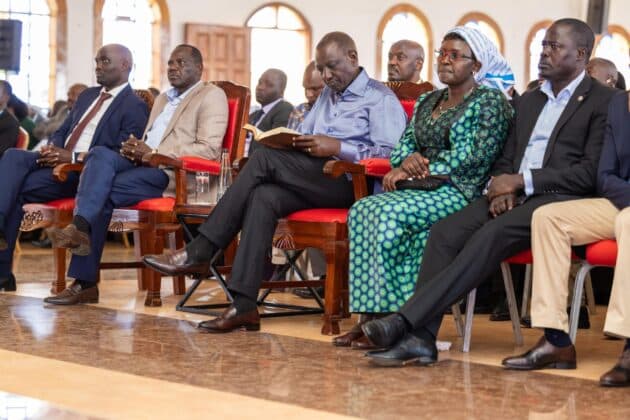We're loading the full news article for you. This includes the article content, images, author information, and related articles.
As Nairobi sees hundreds of churches mushroom across slums, critics debate poverty, politics, cult deaths, and the future of faith in Kenya.

Nairobi, Kenya — 2025-09-22 16:00 EAT.
Kenya’s capital is witnessing a church-building frenzy unlike any in its history — with some slum neighborhoods hosting hundreds of sanctuaries within just a few blocks. As worship spaces multiply, critics cite poverty, politics, and cult tragedies, reigniting old questions about faith, freedom, and state oversight.
In Nairobi’s Uthiru-Kosovo area, more than 300 churches squeeze into two acres, separated by iron sheets and narrow alleyways. Across informal settlements from Mukuru kwa Njenga to Mathare, new congregations appear almost weekly.
Supporters hail churches as spiritual lifelines and social safety nets, offering food, counseling, and community in hard times. Critics counter that some sanctuaries double as political stages, economic ventures, or — as the 2023 Shakahola massacre showed — potential sites of deadly exploitation.
The government now faces pressure to balance freedom of worship with public safety and financial accountability.
Religion’s grip on Kenya dates back to colonial missions and independence-era churches that mobilized communities against injustice. Today, Christianity claims 85% of Kenya’s population, but its rapid commercialization and political entanglements have raised alarms:
2023: Over 450 people die in Kilifi’s Shakahola starvation cult led by pastor Paul Mackenzie.
2024: Protests erupt over rising tithes, noise pollution, and prosperity gospel preachers flaunting wealth.
2025: Cabinet approves plans for a Religious Affairs Commission to register churches, enforce transparency, and train clerics.
Analysts warn that without reform, churches risk drifting from spiritual missions toward political and commercial agendas.
Constitution of Kenya (Art. 32): Guarantees freedom of religion, belief, and opinion.
Religious Organizations Bill (Draft, 2025): Proposes registration, financial audits, and leadership standards for churches.
Cabinet Task Force Recommendations (2025): Suggest creation of a Religious Affairs Commission to license clergy, regulate religious media, and investigate cult activity.
Next Steps: Bill expected in Parliament by December 2025; public hearings planned in all 47 counties.
Government:
“We respect freedom of worship but cannot ignore Shakahola’s lessons,” said Interior CS Kithure Kindiki on July 12, 2025. “Oversight protects lives, not politics.”
Clergy:
“Churches bring peace where government fails,” argued Pastor David Likoko of Uthiru’s New Life Church on September 20. “We run feeding programs, pay school fees, and rescue addicts. Regulation must not punish genuine ministries.”
Residents:
“Without these churches, slums would drown in crime,” said Everlyn Mwende, a single mother in Mukuru. “Pastors help with food and counseling when the government is nowhere.”
Critics:
“Some pulpits are ATMs for politicians,” noted Faith Masita, a Nairobi youth activist. “They endorse candidates for donations while preaching prosperity to the poor.”
|
Indicator |
Figure / Source |
Date Verified |
|---|---|---|
|
Churches in Nairobi slums |
3,200+ (County Religious Dept.) |
Sept 2025 |
|
Shakahola cult deaths |
450+ (Govt Inquiry Report) |
Dec 2023 |
|
Informal settlements population |
2.5M+ (Kenya National Bureau of Stats) |
Aug 2025 |
|
Proposed Religious Affairs Budget |
KSh 2.1B (Cabinet Task Force Report) |
July 2025 |
Security: Unregulated sects risk repeating Shakahola-style tragedies.
Politics: Pulpit-politics ties blur church-state boundaries ahead of 2027 elections.
Economy: Prosperity gospel critics warn of financial exploitation amid high poverty rates.
Social Fabric: Churches fill welfare gaps but risk replacing state accountability.
Will Parliament pass the Religious Organizations Bill before 2026?
How will regulation avoid infringing on constitutional freedoms?
Can government oversight prevent cults without fueling political interference?
1844: Karl Marx calls religion “the opium of the people.”
2023-04: Shakahola cult deaths trigger calls for regulation.
2025-07: Cabinet approves Religious Affairs Commission proposal.
2025-09: Nairobi church numbers hit historic highs amid poverty and protests.
Parliamentary debate on Religious Organizations Bill – Dec 2025.
Court challenges likely from clergy opposing state oversight.
Election campaigns using churches as political mobilization platforms.
[Explainer: Shakahola Tragedy and Kenya’s Church Regulation Debate]
[Analysis: How Poverty Fuels Nairobi’s Mushrooming Churches]
Keep the conversation in one place—threads here stay linked to the story and in the forums.
Sign in to start a discussion
Start a conversation about this story and keep it linked here.
Other hot threads
E-sports and Gaming Community in Kenya
Active 9 months ago
The Role of Technology in Modern Agriculture (AgriTech)
Active 9 months ago
Popular Recreational Activities Across Counties
Active 9 months ago
Investing in Youth Sports Development Programs
Active 9 months ago